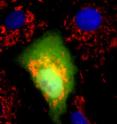Einstein researchers discover a protein that amplifies cell death
Scientists at Albert Einstein College of Medicine of Yeshiva University have identified a small intracellular protein that helps cells commit suicide. The finding, reported as the "paper of the week" in the January 16th print issue of the Journal of Biological Chemistry, could lead to drugs for combating cancer and other diseases characterized by overproduction of cells. The research was led by the late Dennis Shields, Ph.D., a professor in Einstein's Department of Developmental and Molecular Biology for 30 years, who died unexpectedly in December. In response to stress or as a natural part of aging, many cells undergo programmed suicide, also known as apoptosis. Cancer cells often become immortal and dangerous by developing the ability to suppress apoptosis.
A decade ago apoptosis was thought to be directed solely by the nucleus and mitochondria of cells. Dr. Shields' laboratory was the first to show that a cellular organelle known as the Golgi apparatus also plays a role in apoptosis.
The Golgi package proteins and other substances made by cells and direct them to their destination within the cell. A protein called p115 is vital for maintaining the structure of the Golgi. In earlier research, Dr. Shields' group demonstrated that the Golgi's p115 protein splits into two pieces early in apoptosis and that the smaller of these protein fragments—205 amino acids in length—helps to maintain the cell-suicide process.
In the present study, the Einstein researchers identified the smallest region of this p115 protein fragment that is required for apoptosis: a peptide of just 26 amino acids in length that exerts its apoptotic action by traveling to the nucleus.
"Dennis Shields was one of our most outstanding scientists," says E. Richard Stanley, Ph.D., chairman of developmental and molecular biology at Einstein. "His efforts to uncover fundamental mechanisms governing how cells work has led to new ways of thinking about apoptosis, in particular, how the Golgi regulates this process."
Source: Albert Einstein College of Medicine
Other sources
- Researchers Discover a Protein that Amplifies Cell Deathfrom Newswise - ScinewsFri, 16 Jan 2009, 15:35:52 UTC
- Protein That Amplifies Cell Death Discovered: Potentially A New Way To Kill Cancer Cellsfrom Science DailyFri, 16 Jan 2009, 2:35:36 UTC
- Einstein researchers discover a protein that amplifies cell deathfrom Biology News NetThu, 15 Jan 2009, 19:29:31 UTC
- Researchers discover a protein that amplifies cell deathfrom PhysorgThu, 15 Jan 2009, 12:56:18 UTC
- Einstein researchers discover a protein that amplifies cell deathfrom Biology News NetThu, 15 Jan 2009, 2:56:23 UTC
- Researchers Discover a Protein that Amplifies Cell Deathfrom Newswise - ScinewsWed, 14 Jan 2009, 22:28:06 UTC
- Einstein scientist's finding highlighted as 1 of 15 'evolutionary gems' by Naturefrom PhysorgMon, 12 Jan 2009, 21:21:31 UTC
- Einstein Scientist's Finding Highlighted as One of 15 'Evolutionary Gems' by Naturefrom Newswise - ScinewsMon, 12 Jan 2009, 20:28:06 UTC
